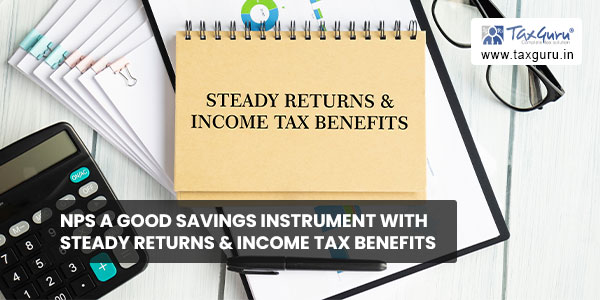National Pension System (NPS) a good savings instrument with steady returns & Income Tax Benefits
National Pension System (NPS) is still not very popular amongst individual assessees for the simple reason that people are not familiar with the advantages of NPS. It is one of the best way of saving, steady returns & Income Tax benefits.
It is undisputed that Pension is a boon for old-age when income shrinks. It is pertinent that Pensions are no more available for Government and semi Government employees who have joined service after a particular cut off date. The employees of the private sector never had the advantages of a regular pension post retirement. With the introduction of NPS (National Pension System), all individuals can plan their retirement by opting for this voluntary retirement saving scheme.
NPS is a platform promoted by the Government of India with an initiative to provide a pension opportunity to every Indian. In the beginning in 2004, it was exclusively for Government employees but from 2009 it has been opened for all individuals. The contribution made under the NPS is pooled in a common Pension Fund which is invested in Equities, Debts and Government securities by their approved fund managers, as per the guidelines laid down by PFRDA ( Pension Fund Regulatory & Development Authority).The investment made grows and the returns accumulated in the Pension fund.

Any citizen of India, whether resident or non-resident, aged between 18 – 60 years can contribute to NPS. After attaining 60 years of age, the existing subscriber will not be permitted to make further contributions to the NPS accounts. However, he has the option to exit from NPS even before attaining the age of 60 years. In the event of death of the subscriber, there would be mandatory exit. The accumulated wealth depends on the contributions made and the income generated from the investments made by such corpus.
Thus Contributions + Investment Growth – Charges = Accumulated Pension Wealth.The investment in NPS is independent of one’s contribution to any Provident Fund and an individual can simultaneously contribute to NPS as well as EPF/PF.
Every individual subscriber is issued a Permanent Retirement Account Number (PRAN) Card which has a 12 digit unique number. Under NPS account, two sub-accounts – Tier I & II are provided.
Tier-I account is a non-withdrawable retirement account which can be withdrawn only upon meeting the exit conditions prescribed under NPS. However, Tier-II account is a voluntary savings facility available as an add-on to any
Tier-1 account holder. Subscribers will be free to withdraw their savings from this Tier -II account whenever they wish. The Government does not make any contribution to the subscriber’s NPS account. A subscriber has to contribute a minimum annual contribution of Rs.6000/- for his Tier I account in a financial year else his account will be frozen. There are a number of Pension Fund Managers (PFM’s) who manage the subscriber funds at the option of the subscriber.
There is Income Tax rebate available for investment in NPS wherein additional Rs 50,000 can be claimed as exemption for contribution in the National Pension System (NPS) scheme under section 80CCD (1B) of the Income Tax Act. This is besides Rs. 1,50,000/- exemption u/s 80 C of the Income Tax Act.
The Finance Act 2020, has introduced a new income tax regime wherein the taxpayers get an option to choose a tax slab that has lower rates of Income Tax. However in order to opt for the new income tax slab, the taxpayer has to forgo income tax benefits under Section 80C, Section 80 CCD (1) and many more deductions and exemptions. But, the exemption for contribution to National Pension System under Section 80 CCD (2) is available even when they have chosen new income tax regime.
Thus, investment in NPS is beneficial on all counts and young individuals should contribute to NPS for future regular returns and present Income Tax rebate.






nice blog
Point To Focus (: “…….But, the exemption for contribution to National Pension System under Section 80 CCD (2) is available even when they have chosen new income tax regime….”
For MORE Read ON..